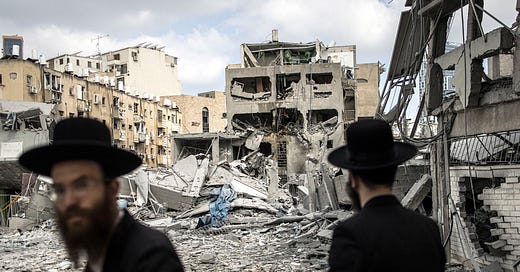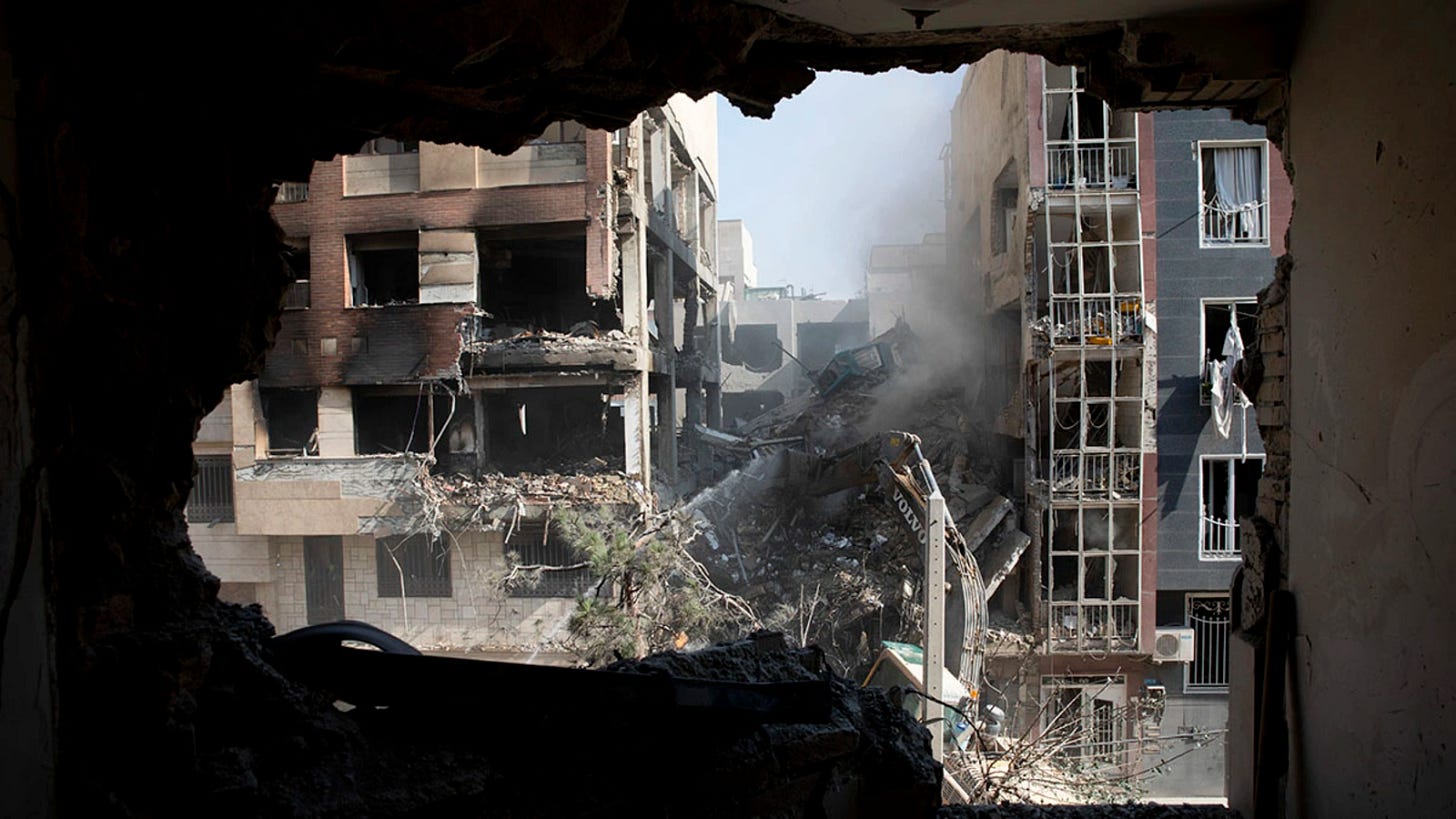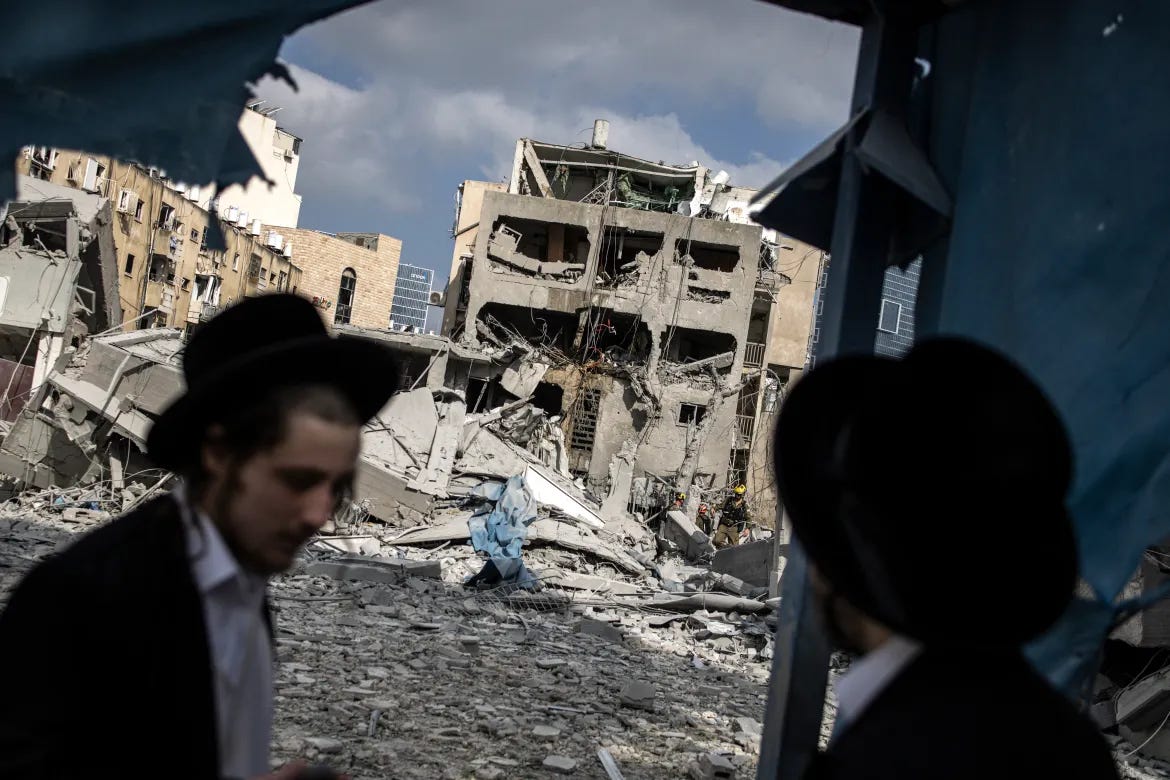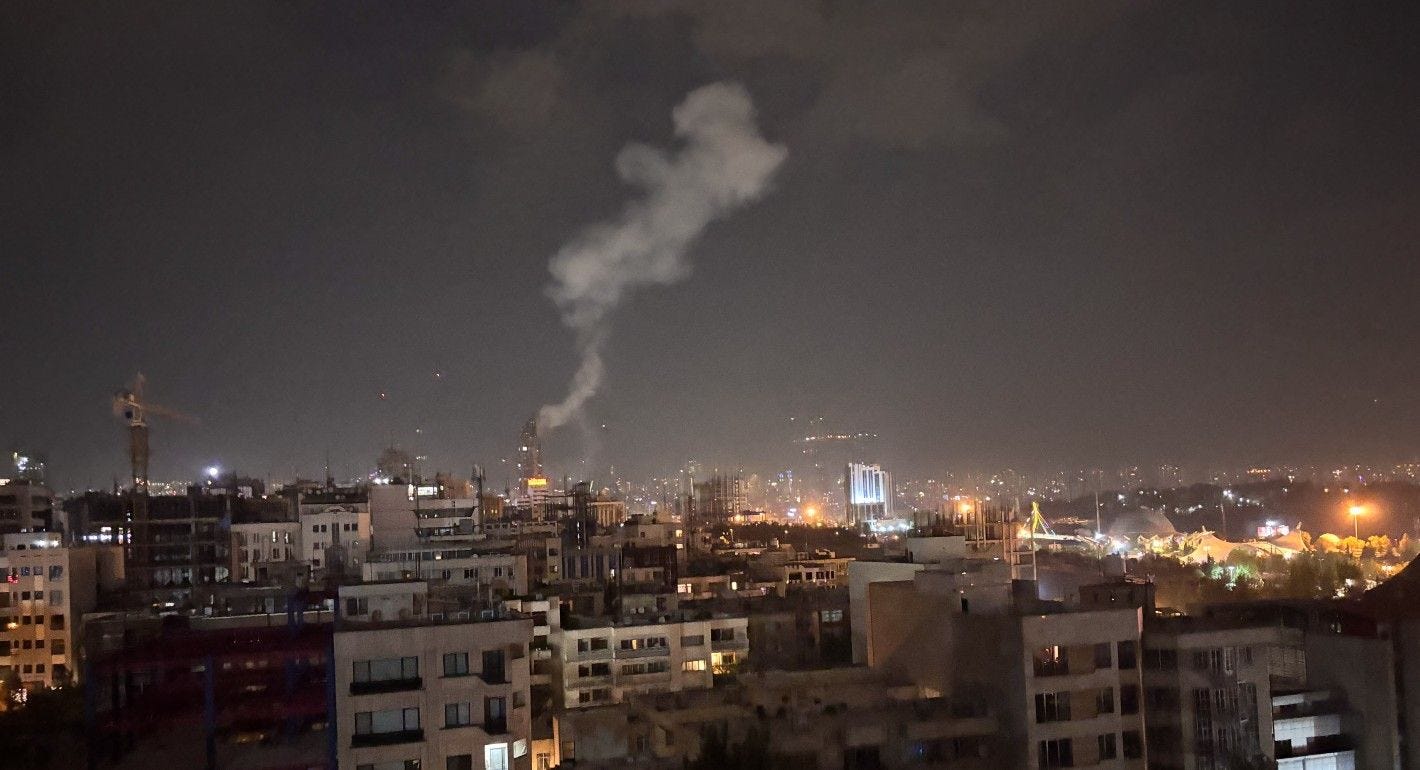The long-standing shadow war between Israel and Iran has recently erupted into a direct and overt conflict, marking a perilous new chapter in Middle Eastern geopolitics. For decades, the rivalry between the two regional powers has been characterized by covert operations, cyber-attacks, and proxy warfare. However, the recent Israeli airstrikes targeting Iran's nuclear facilities and military installations, and Iran's subsequent retaliatory measures, have shattered this fragile status quo, pushing the region towards a dangerous precipice. This direct military engagement, a significant departure from the previous rules of engagement, has not only heightened the risk of a full-scale regional war but has also drawn in global powers, each with their own strategic interests and concerns. The implications of this escalation are far-reaching, impacting everything from global energy security to nuclear non-proliferation efforts.
In the following analysis, we will delve into the intricacies of this escalating conflict, drawing upon the insights of leading experts from some of the world's most respected think tanks. We will explore the motivations behind Israel's pre-emptive strikes, the potential for Iranian retaliation, and the broader geopolitical ramifications for the Middle East and beyond. By examining the nuanced perspectives of these experts, we aim to provide a comprehensive understanding of the current crisis and what may lie ahead.
A Chorus of Concern: What the World's Top Analysts are Saying
We begin with the Royal United Services Institute, or RUSI, where Dr. Julie Norman, a Senior Associate Fellow, provides a sobering assessment of the conflict's intractability. Dr. Norman argues that both Israel and Iran view this conflict in existential terms, a perception that severely complicates any attempts at de-escalation. For Israel, under the leadership of Prime Minister Netanyahu, the primary objective has long been the neutralization of Iran's nuclear capabilities, which it views as an unacceptable threat to its very existence. The recent strikes, codenamed 'Rising Lion', were the culmination of a strategy developed in the autumn of 2024. Dr. Norman also points to the perception of US complicity in the Israeli attack, a perception fueled by the ongoing, albeit now stalled, nuclear negotiations between Washington and Tehran. While Iran's conventional military capabilities may have been weakened, it is highly unlikely to back down. Instead, it may resort to a variety of retaliatory measures, including attacks on US allies in the region and the disruption of global shipping routes. A crucial, and perhaps intended, consequence of this conflict, as Dr. Norman notes, is its diversion of international attention from the ongoing crisis in Gaza, further complicating efforts to find a lasting peace in the region. RUSI's analysis concludes on a pessimistic note, suggesting that the Middle East is facing a long and perilous road ahead, with very limited options for effective mediation.
Moving to the RAND Corporation, a research organization with deep ties to the US defense establishment, a panel of experts provides a multi-faceted analysis of the conflict. They concur that the recent exchange of strikes represents a significant and dangerous escalation. The RAND experts suggest that Israel felt it was running out of time to prevent Iran from acquiring a nuclear weapon, a sentiment that drove the decision to launch a pre-emptive strike. They anticipate that Iran, rather than seeking a diplomatic off-ramp, is likely to intensify its military response in the coming weeks and months. In a particularly candid assessment, the RAND experts argue that the United States should allow Israel to continue its attacks on Iran. Their reasoning is rooted in a cold, geopolitical calculus: Iran is an ally of Russia and is increasingly aligned with China; therefore, a weakened Iran would, by extension, harm the interests of these two global rivals. However, the RAND analysis also acknowledges the inherent risks of this strategy. They warn that the Israeli strikes could harden Iranian resolve to develop nuclear weapons, potentially leading to a nuclearized Middle East. Furthermore, any attack on Gulf Arab oil infrastructure or the blockade of the Strait of Hormuz could cause a spike in energy prices, raising the risk of a global recession.
The Center for Strategic and International Studies, or CSIS, offers a similarly grim outlook. Daniel Byman, the director of the Warfare, Irregular Threats, and Terrorism Program at CSIS, argues that while the Israeli strikes are likely to set back Iran's nuclear program, they will not be a fatal blow. Parts of the program will remain intact, and Iran will undoubtedly seek to retaliate. Byman makes a crucial point about Israel's changing risk tolerance. He notes that before the events of October 7th, 2023, the prospect of a direct conflict with Iran was deterred by the potential for a massive response from Hezbollah and other Iranian proxies. However, the trauma of the October 7th attacks has fundamentally altered Israel's strategic calculus, making it more willing to take offensive action against Iran. Byman also raises doubts about the long-term effectiveness of the Israeli strikes, pointing out that Iran's nuclear sites are hardened and well-protected. He concludes with a warning that the ensuing conflict could inadvertently draw the United States into a direct confrontation with Iran, a scenario the Trump administration has publicly stated it wishes to avoid.
From the Council on Foreign Relations, Michael Froman argues that the Israeli strikes have fundamentally reshaped the security landscape of the Middle East. He points to several factors that contributed to the timing of the attack, including the expiration of a deadline set by the Trump administration for nuclear negotiations with Iran, and a recent censure of Iran by the International Atomic Energy Agency. Froman asserts that the strikes have significantly damaged Iran's military capabilities, eliminating much of its military high command and destroying key drone and ballistic missile facilities, as well as the nuclear enrichment sites at Natanz and Fordow. He casts doubt on Iran's ability to mount a proportionate counter-attack, suggesting its options for retaliation are limited. The strikes, he argues, have also raised serious questions about the legitimacy and stability of the Iranian regime. While the United States did not actively participate in the attacks, it has vowed to defend Israel from any Iranian retaliation. Froman concludes that Israel's actions have, in effect, consolidated a dominant American security infrastructure in the region, but the long-term consequences of this new reality are still highly uncertain.
Chatham House, the Royal Institute of International Affairs, provides a two-pronged analysis. First, Dr. Marion Messmer, a Senior Research Fellow in the International Security Programme, warns that Israel's strikes might have the unintended consequence of accelerating Iran's race towards a nuclear weapon. The attacks, she argues, have exposed the weakness of Iran's conventional deterrence, which could paradoxically strengthen the hand of hardliners in Tehran who have long advocated for a nuclear deterrent. Dr. Messmer notes that the attacks occurred during a period of reprised nuclear diplomacy between the US and Iran, a diplomatic track that has now been derailed. The International Atomic Energy Agency has expressed growing concern about Iran's undeclared nuclear materials and the difficulties it faces in monitoring Iran's nuclear program. According to current intelligence estimates, Iran already possesses enough enriched uranium to produce nine nuclear weapons. Dr. Messmer emphasizes that from Israel's perspective, an Iranian nuclear program is an existential threat that cannot be tolerated. However, she warns that a pre-emptive strike by Israel could backfire, pushing Iran to quickly develop a rudimentary nuclear weapon to deter further attacks. The prospect of a nuclear strike to eradicate a developing nuclear program would be a profoundly destabilizing event for the entire international security architecture. Dr. Messmer concludes that a diplomatic solution between Iran and the US is the only viable path to prevent a dangerous and unpredictable escalation.
In a second piece from Chatham House, Dr. Sanam Vakil, Bronwen Maddox, and Farea Al-Muslimi offer a collaborative analysis. Dr. Vakil describes the Israeli strike as a provocative act with multiple objectives: eliminating key commanders, damaging Iran's nuclear program, and weakening its defenses. However, she warns that this action risks escalating the regional conflict and could inadvertently strengthen the Islamic Republic by rallying a 'rally 'round the flag' effect. She anticipates that Iran will likely retaliate by advancing its nuclear program and suspending its cooperation with international monitoring agencies. Bronwen Maddox, the Director of Chatham House, adds that the strike not only jeopardizes US-Iran diplomatic talks but also demonstrates Israel's disregard for Washington's views. She warns of the potential for regional destabilization, with Iran possibly targeting US-aligned neighbors. Farea Al-Muslimi, a specialist on Yemen, highlights the likely role of the Houthis in any Iranian retaliation. He suggests that the Houthis, positioned as Iran's "first line of defense," are likely to play a significant role in retaliating against Israel, potentially by attacking US military bases and naval forces in the region, which could, in turn, reignite the conflict in Yemen and the Red Sea.
Finally, the Brookings Institution brings together a diverse group of experts to dissect the multifaceted implications of the conflict. Aslı Aydıntaşbaş argues that while Israel's strikes have been initially successful in degrading Iran's nuclear program, to fully achieve its objectives, Israel will require advanced US weaponry and support, raising the critical question of whether the US will become more deeply involved in the conflict. Vanda Felbab-Brown highlights Israel's mastery of clandestine operations and suggests that the weakness of Iran's counterintelligence will hamper its ability to rebuild its proxy networks. Samantha Gross and Louison Sall focus on the economic fallout, noting the volatility in the global oil market and the concerns about disruptions to Iranian oil production and the potential closure of the Strait of Hormuz. Itamar Rabinovich observes that Iran's decision to engage in direct conflict with Israel marks a shift away from its long-standing reliance on regional proxies. Finally, Yun Sun discusses China's perspective, noting that the Israeli strikes exacerbate Beijing's concerns about energy security and regional instability, and that China may have a role to play in easing tensions.
Connecting the Dots
In synthesizing these expert analyses, several key themes emerge. There is a broad consensus that the direct military confrontation between Israel and Iran represents a dangerous new phase in their long-standing rivalry. While the immediate trigger was Israel's pre-emptive strike, the underlying causes are rooted in decades of animosity and a mutual perception of existential threat.
A significant point of contention revolves around the ultimate impact of the Israeli strikes on Iran's nuclear ambitions. While some analysts, particularly from the Council on Foreign Relations, believe the strikes have dealt a severe blow to Iran's nuclear program and military capabilities, others, from institutions like Chatham House and CSIS, warn that the attacks could backfire, accelerating Iran's pursuit of a nuclear weapon as the ultimate deterrent.
The role of the United States is another critical and complex issue. The perception of US complicity, as noted by RUSI, and the explicit call from RAND for the US to allow Israel to continue its attacks, highlight the deep entanglement of American interests in the conflict. However, the potential for the US to be drawn into a direct military confrontation with Iran, a scenario that most experts agree would be catastrophic, remains a significant concern.
The economic implications, particularly for global energy markets, are also a recurring theme. The potential for a spike in oil prices and the disruption of global trade routes underscores the far-reaching consequences of this regional conflict.
Finally, there is a clear recognition that the conflict is not unfolding in a vacuum. It is deeply intertwined with other regional dynamics, including the war in Gaza, the activities of Iranian proxies like Hezbollah and the Houthis, and the strategic interests of global powers like Russia and China.
In conclusion, the expert analyses we have examined paint a grim and uncertain picture of the future of the Middle East. While there are differing perspectives on the precise trajectory of the conflict, there is a shared understanding that the region is at a critical inflection point. The path ahead is fraught with peril, and the choices made by the key actors in the coming weeks and months will have profound and lasting consequences for regional and global security. The hope for a diplomatic off-ramp remains, but as the drums of war beat louder, the window for a peaceful resolution appears to be rapidly closing.
If you enjoyed, support us by subscribing to our Substack and sharing it with others. We're dedicated to summarizing the latest research from leading defense think tanks around the world. We'd also love to hear your thoughts on this topic. Feel free to share your perspective and answer the discussion questions we have prepared on our Substack. If there’s a specific topic you’d like us to cover next, please get in touch.
Finally, if you're looking to enhance your skills, we partner with expert providers worldwide to offer specialized training. Whether you're a professional looking to hone your craft, a civilian interested in personal safety, a veteran transitioning careers, or active-duty personnel seeking specialized development, we provide courses in firearms, close protection, CQB, intelligence, and more.
Learn more at Mislnet.com.
Discussion Questions
The podcast highlights how both Israel and Iran view this conflict in "existential terms." How does this perception of an existential threat complicate de-escalation efforts, and what might be required to shift this fundamental understanding on either side?
Several think tanks offer differing opinions on the effectiveness of Israel's strikes on Iran's nuclear program. Some suggest a severe blow, while others warn of potential acceleration. What are the key factors that could determine the ultimate long-term impact of these strikes, and what are the most significant risks of miscalculation regarding Iran's nuclear ambitions?
The role of the United States is a prominent theme, with discussions ranging from perceived complicity to calls for allowing continued Israeli attacks. How does the US balance its support for Israel's security with its desire to avoid direct military confrontation with Iran, and what are the potential consequences of each approach for regional stability?
The script mentions the economic implications, particularly for global energy markets. Beyond oil prices, what other economic sectors or regions might be significantly impacted by a prolonged or escalating conflict, and what measures could be taken to mitigate these risks?
The conflict is described as deeply intertwined with other regional dynamics, such as the war in Gaza and the activities of proxies like Hezbollah and the Houthis. How do these interconnected conflicts influence the current Israel-Iran confrontation, and what are the challenges in de-escalating one conflict without exacerbating others in the region?
Let us know your thoughts!












Share this post